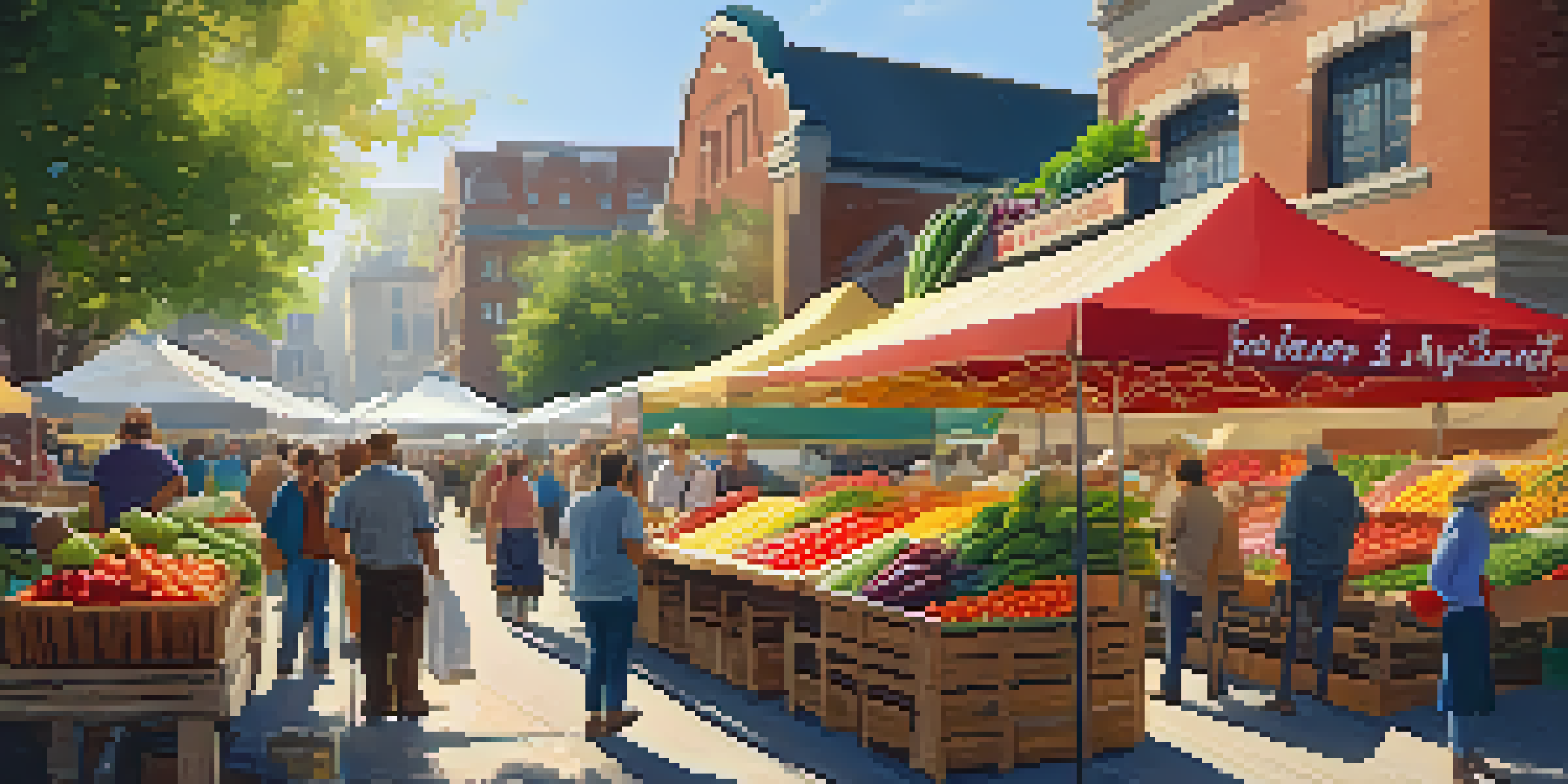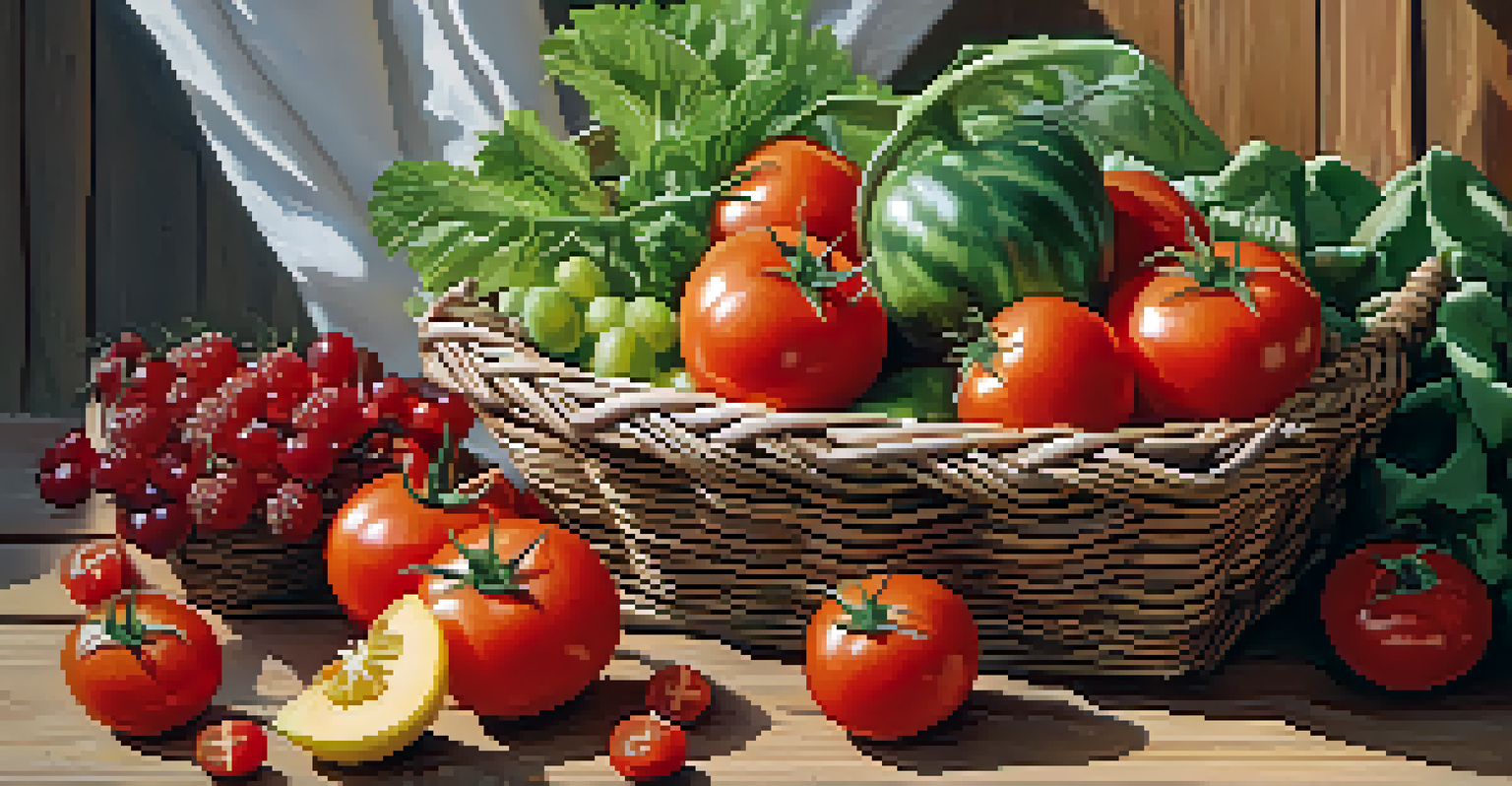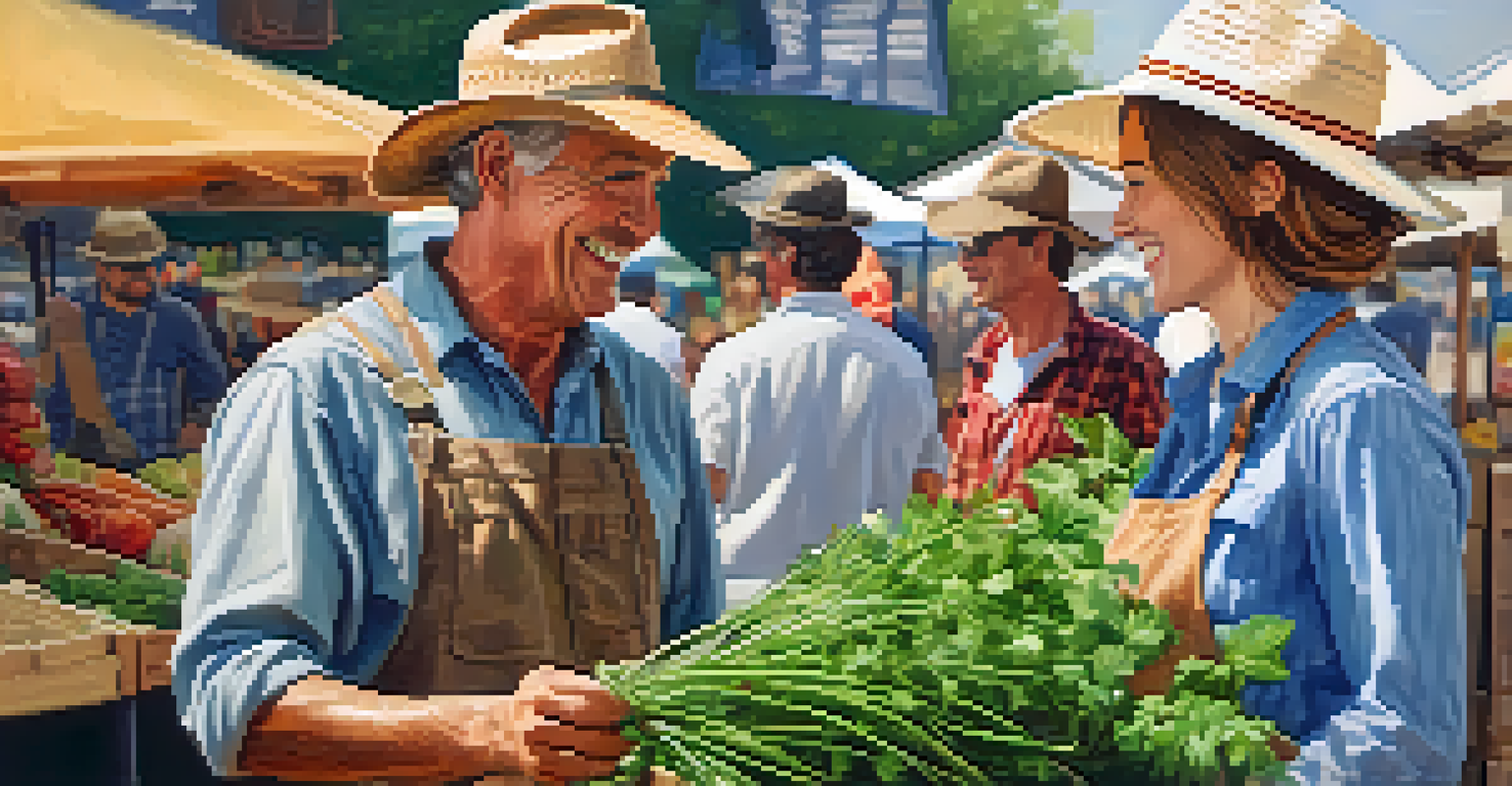Exploring Local Farmers' Markets: A Community Guide

Understanding the Importance of Farmers' Markets
Farmers' markets play a crucial role in local economies by supporting small-scale farmers and producers. These markets create a direct connection between consumers and those who grow their food, fostering a sense of community. When you buy from local vendors, you're not just purchasing fresh produce; you’re contributing to the sustainability of your neighborhood.
The future of food is local.
In addition to bolstering local economies, farmers' markets are also vital for promoting seasonal eating. They offer a wide variety of fruits and vegetables that are in peak season, meaning they are fresher and often tastier than supermarket alternatives. This seasonal approach encourages healthier eating habits, which can have long-term benefits for your well-being.
Moreover, these markets are fantastic places to learn about food. Many vendors are happy to share tips on preparation, storage, and even recipes, making it a great opportunity to expand your culinary skills. This educational aspect adds another layer of value to your shopping experience, making it not just a transaction but a learning opportunity.
What to Expect at Your Local Farmers' Market
When you visit a farmers' market, you can expect a vibrant atmosphere filled with colors, sounds, and scents. From the sight of fresh produce to the smell of baked goods, it’s a feast for the senses. You'll typically find a wide variety of items, including fruits, vegetables, meats, dairy products, and even handmade crafts that reflect the local culture.

Each vendor at the market brings something unique, and it’s not uncommon to strike up a conversation with the farmers themselves. They often have stories to share about their farming practices, sustainability efforts, and the journey of their products from farm to table. This personal touch enriches your shopping experience and helps you appreciate the hard work that goes into each item.
Support Local Economies
Farmers' markets strengthen local economies by connecting consumers directly with small-scale farmers and producers.
Don't forget to arrive hungry! Many markets feature food stalls and vendors selling ready-to-eat meals, snacks, and beverages. You can enjoy everything from fresh juices to gourmet sandwiches, allowing you to indulge in local flavors while supporting the community.
How to Prepare for Your Visit to the Market
Preparation is key to making the most of your trip to the farmers' market. Start by checking the market's schedule and location, as some markets operate only on specific days. Knowing what to expect ahead of time can help you plan your visit around special events, like live music or cooking demonstrations.
Eating locally is not just a trend; it’s a way to support your community and environment.
It’s also wise to bring reusable bags for your purchases, as many vendors prefer them over plastic. Not only does this help the environment, but it also makes it easier to carry your items. If possible, consider bringing cash, as some smaller vendors may not accept credit cards, although many markets are increasingly adopting mobile payment options.
Lastly, think about what you want to buy. Creating a shopping list can help you stay focused and avoid impulse purchases, especially since the array of tempting items can be overwhelming. However, keep an open mind—sometimes a spontaneous purchase leads to delicious new discoveries!
Connecting with Local Farmers and Producers
Farmers' markets offer a unique opportunity to meet the people who grow your food. By engaging with local farmers, you can gain insight into their farming practices, learn about organic methods, and understand the challenges they face. This connection fosters a deeper appreciation for the food you consume and encourages a sense of community responsibility.
As you interact with these producers, don’t hesitate to ask questions about their products. Whether it's how to store fresh herbs or the best way to cook a particular vegetable, most farmers are eager to share their knowledge and expertise. This dialogue not only enhances your cooking skills but also helps build relationships that can last beyond the market.
Embrace Seasonal Eating
Shopping at farmers' markets allows you to enjoy fresh, in-season produce, promoting healthier eating habits.
Additionally, supporting local farmers contributes to sustainable agriculture. By choosing to buy locally, you reduce the carbon footprint associated with transporting goods over long distances. This small change in your shopping habits can lead to significant positive impacts on the environment.
Seasonal Produce: What to Look For
One of the highlights of visiting farmers' markets is discovering seasonal produce. Each season brings its own bounty, and understanding what's in season can enhance your meals and promote variety in your diet. For instance, spring is famous for tender greens and radishes, while summer brings an abundance of tomatoes and berries.
Shopping seasonally not only supports local farmers but also allows you to enjoy fruits and vegetables at their peak flavor and nutritional value. When you select in-season produce, you’re likely to find fresher items that haven't traveled far, meaning they’re tastier and more nutritious. Plus, it’s a fun way to explore new ingredients and recipes.
Consider asking vendors for their recommendations on seasonal items. They can guide you towards the best picks of the day, which can lead to delightful culinary experiments. Embracing seasonal eating can transform your meals and make grocery shopping an exciting adventure.
The Benefits of Buying Organic and Sustainable Products
Many farmers' markets feature organic and sustainably produced products. Choosing organic options can reduce your exposure to harmful pesticides and chemicals, promoting better health for you and your family. Additionally, organic farming often prioritizes environmental stewardship, which benefits the planet.
Sustainable practices, such as crop rotation and soil health management, are crucial for maintaining ecosystems and ensuring that future generations can enjoy healthy food. By supporting farmers who employ these methods, you’re contributing to a more sustainable food system and encouraging responsible farming practices.
Engage with Farmers
Visiting farmers' markets provides an opportunity to connect with local farmers, learn about their practices, and appreciate the effort behind your food.
Moreover, purchasing organic and sustainable products often means you’re supporting local farmers who take pride in their practices. This not only reinforces your connection to the community but also encourages more farmers to adopt environmentally friendly methods. Your choices at the market can drive positive change in the agricultural industry.
Tips for Making the Most of Your Market Experience
To truly enjoy your farmers' market experience, consider visiting during off-peak hours. Early mornings or late afternoons tend to be less crowded, allowing for a more relaxed shopping experience. You’ll have the chance to chat with vendors without feeling rushed and explore the market at your leisure.
Don’t forget to bring your family or friends along! Making a trip to the market a social event can enhance the experience. You can share your favorite finds, try different foods together, and even split larger purchases, making it both fun and economical.

Lastly, keep an eye out for special events or workshops hosted by the market. Many farmers' markets offer cooking classes, gardening tips, or seasonal festivals that add an extra layer of enjoyment. Participating in these activities can deepen your knowledge and appreciation for local food, creating lasting memories.